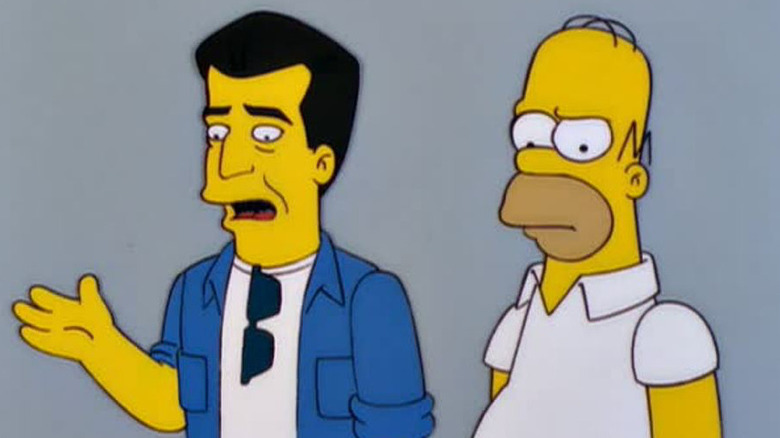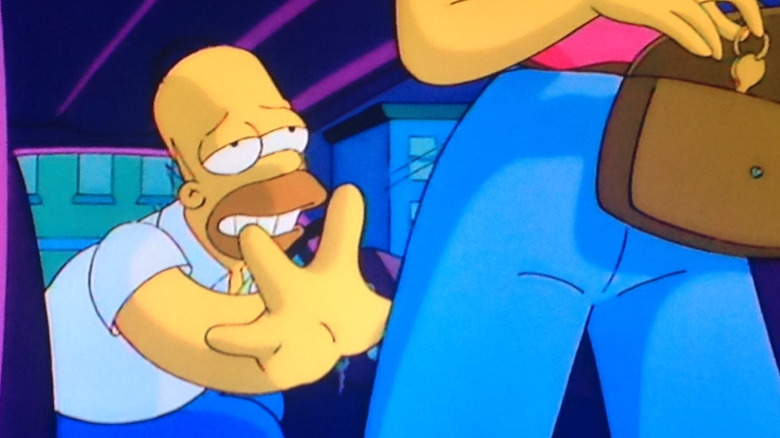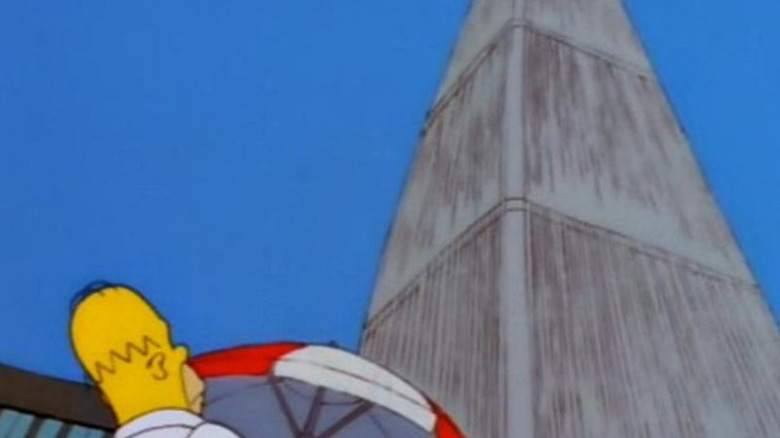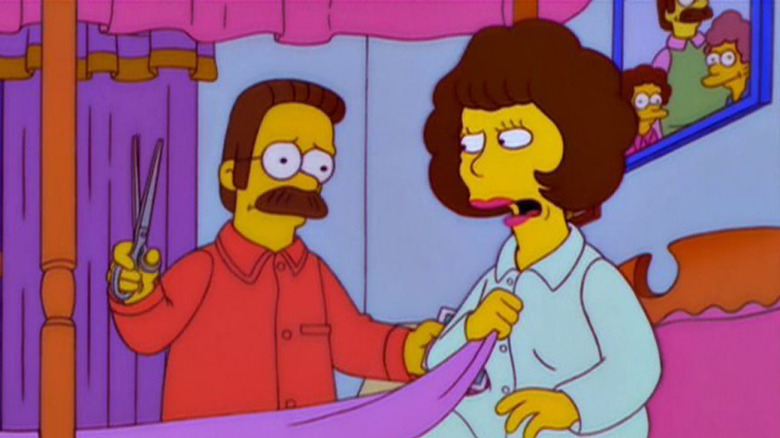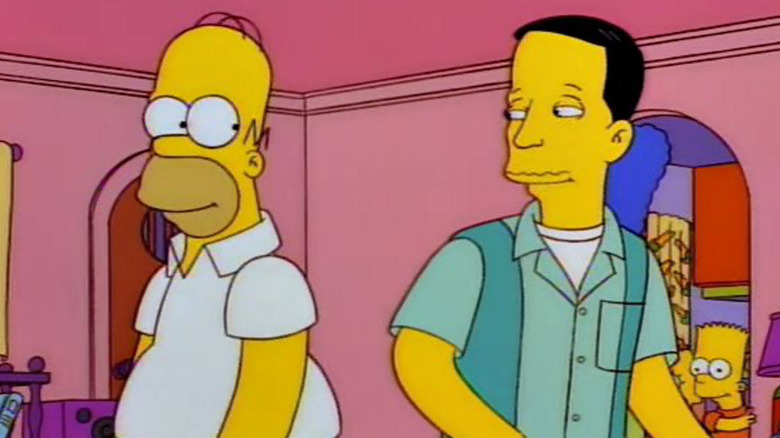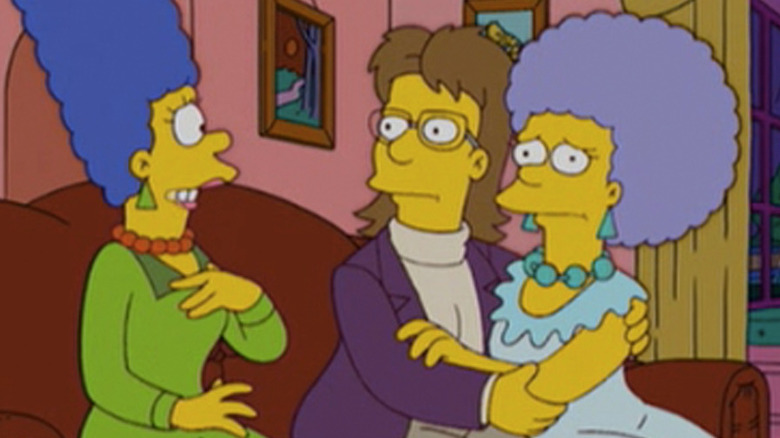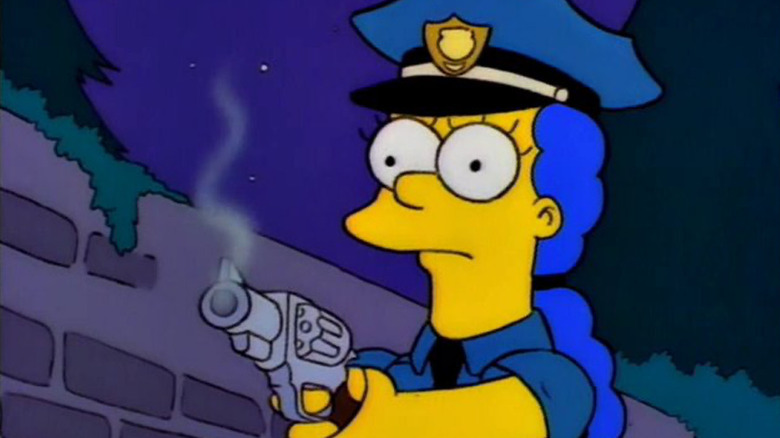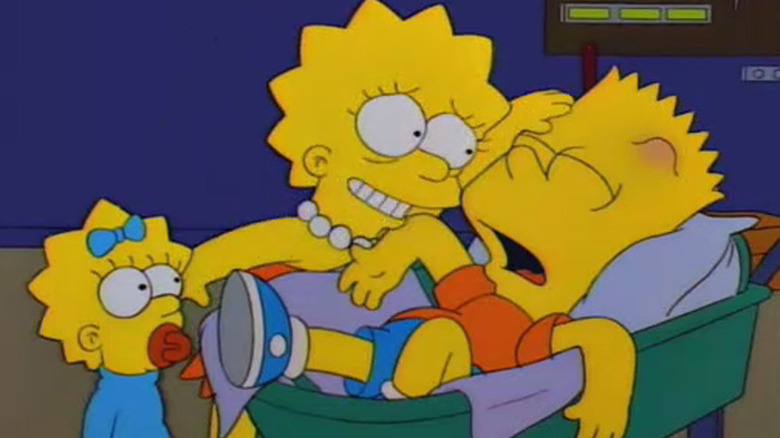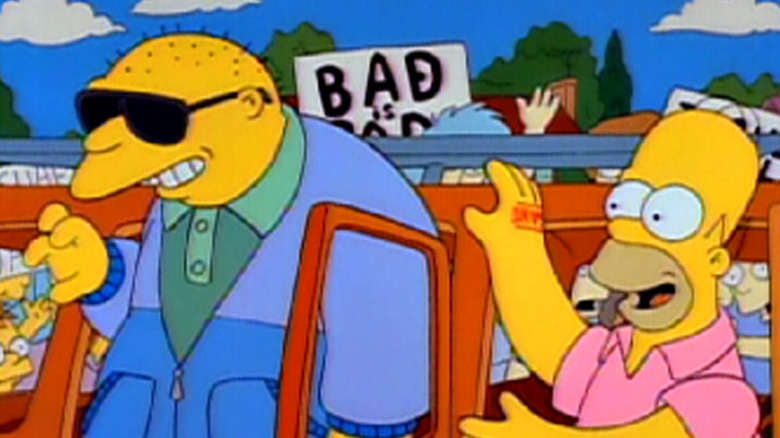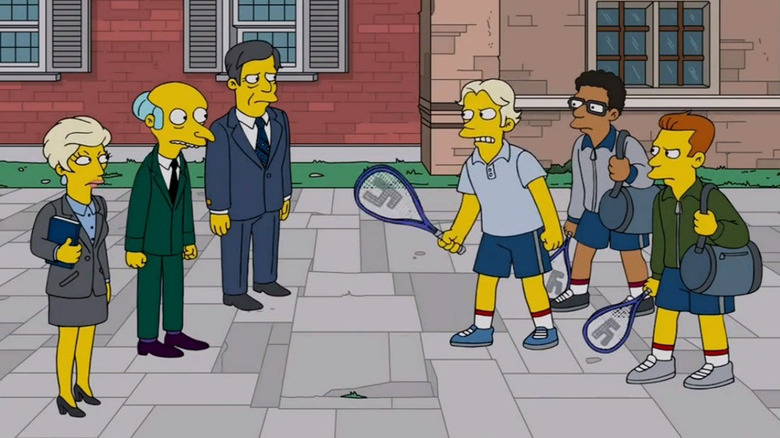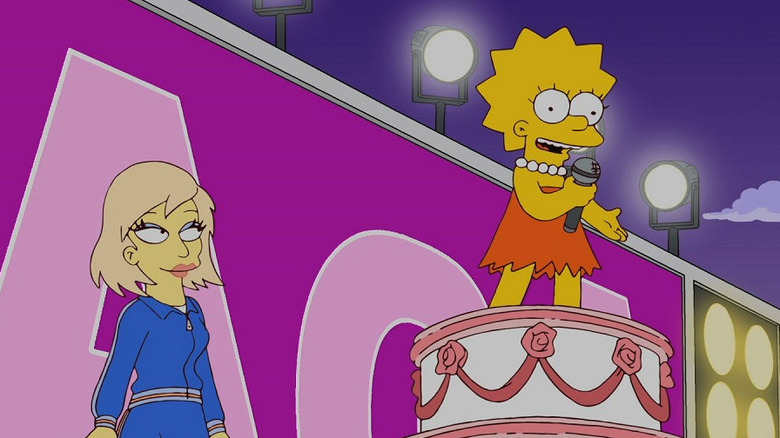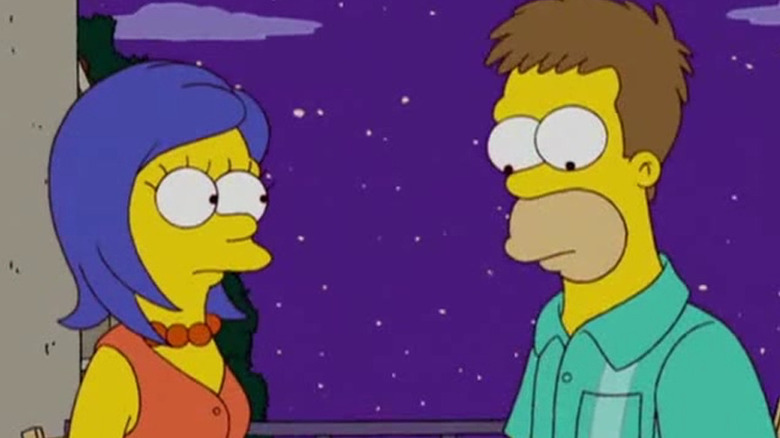The Simpsons Moments That Didn't Age Well At All
If there was ever a series that had its finger on the pulse of pop culture, it would be "The Simpsons." Matt Groening's satirical look at the modern American family has grown into a widespread phenomenon that persists today. Some may argue the series has grown a bit long in the tooth, with many being highly negative about more recent seasons. Despite these criticisms, the show has still maintained its place in the tapestry of adult animation and modern culture, influencing many other creators.
That said, any series that has been around as long as "The Simpsons" is bound to have a few misfires here and there. Considering that the series has been on the air for decades, it's to be expected that some jokes don't hold up nowadays. With that in mind, let's take a look at a few moments from "The Simpsons" that have aged like milk in the sun.
The Mel Gibson appearance
Using a current celebrity for a cameo in a show, either live-action or animated, is always a tricky double-edged sword. If the celebrity endures and remains a positive influence in the world of pop culture, then their appearance will be remembered fondly. However, if they do something to tarnish their own legacy, then any past cameos will be quite awkward down the line. Such is the case for the episode "Beyond Blunderdome," which centers around Homer's escapades with celebrity actor Mel Gibson.
Homer is the only person displeased with an early test screening of a remake of "Mr. Smith Goes to Washington" starring Gibson. This results in him recruiting Homer to "fix" the movie, which only proceeds to make things worse (as involving Homer usually does). The episode is a legitimately funny one, but is unfortunately an uncomfortable watch in the light of Mel Gibson's later behavior. These behaviors would include driving while intoxicated and several belligerent rants that included racist and anti-Semitic language. It's these actions and comments that have made revisiting any of Gibson's previous work a definite challenge for any former fans.
The look at cancel culture
The entertainment world has been and continues to be turned on its head by the widespread #MeToo movement. The movement has resulted in the cancellation of several major celebrities and creators due in major part to the court of public opinion. "The Simpsons," often ahead of the curve on certain topics, had its own take on cancel culture back in 1994. "Homer Badman" begins with a hysterical sequence where Homer pilfers a gummy Venus de Milo from a candy convention. This coincides with Homer having to give the family's new babysitter, Ashley, a ride home. It's during this that Homer's fancy gummy ends up stuck to Ashley's butt, leading to a rather unfortunate misunderstanding as he retrieves it. In record time, Homer is soon a pariah, with everyone in Springfield shunning and shaming him at every turn.
It's a fairly decent look at outrage/cancel culture and the media's ability to turn someone into a persona non grata. However, with 30 years having elapsed since this episode's release, certain aspects of it do not hold up well. While false accusations do indeed happen in real life, a majority of victims speaking out often do turn out to be credible. This is a prophetic episode in many ways, but perhaps one whose stance is no longer the norm in today's modern world.
The visit to New York City
This isn't an issue exclusive to "The Simpsons," but it's one that even the giant yellow juggernaut couldn't escape from. In the wake of September 11, 2001, many films and television shows set in or featuring New York City were severely affected. Any exteriors or establishing shots of the city needed to be edited or updated to no longer include the World Trade Center. One example of this would be the marketing material for Sam Raimi's "Spider-Man" being cut and altered. This tragedy sadly makes watching any material made prior very awkward to watch in insight.
In truth, "The City of New York vs. Homer Simpson" is a great episode, chock-full of amazing verbal and visual jokes. It's just a shame that it was written in 1997 and thus showcases a very different New York City. The episode shows NYC before the events of 9/11, which means the inclusion of an animated rendering of the Twin Towers. The show's creators couldn't have anticipated what would occur just four years later. The episode is still a gem, but suffers from simply being a time capsule for a simpler time for America and the city of New York.
The way Ned cuts a woman's hair
This is a moment few include in their lists of problematic "Simpsons" moments, but it's one worth spotlighting. Ned Flanders is one of the most notable side characters in "The Simpsons." Homer's overly polite, highly devout next-door neighbor has definitely become one of the show's staples. If you see a meme dedicated to the show, there's a good chance it'll be a Ned Flanders one. Ned is a beloved character, but he's not immune to problematic moments, such as the one that occurred in the episode "I'm Goin' to Praiseland."
The episode is a sequel to the episode "Alone Again, Natura-Diddily," which saw the death of Ned's wife Maude. Following Maude's passing (caused in part by Homer), Ned tries to get back into the dating game. The episode concluded with him meeting Rachel, the lead singer for a Christian rock band, and hitting it off. They meet up again in "I'm Goin' to Praiseland" and things quickly get just a little bit awkward. Ned hasn't really moved past Maude, having several items in the house dedicated to her memory, including keeping her impression on the mattress. This leads to a rather uncomfortable moment where Ned cuts her hair in her sleep to resemble Maude's. Whether it's intended as a reference to the biblical story of Samson, reminiscent of Hitchcock's "Vertigo," or just simple Simpsons hilarity, it's a rather invasive and creepy moment with the benefit of hindsight.
The gay panic of Homer Simpson
"Homer's Phobia" is a frustrating oddity of an episode in that it's problematic but has moderately positive intentions. It was an infrequent joke within the series that Homer had some ignorant views, especially when it came to homosexuality. He wasn't antagonistic toward gay males, but would react to them in a terrified, over-the-top way. This joke would take center stage in "Homer's Phobia," which features guest star John Waters, director of the cult classic "Pink Flamingos." In the episode, Homer begins a friendship with John, a charming antique shop owner with a proclivity for campy items. The whole family is taken with John's humor and wit, but things change when Marge reveals to an oblivious Homer that John is gay.
This results in Homer freaking out, which is only exasperated by fears that Bart might be gay as well. Homer then tries to push masculinity onto Bart—a misfire, especially once they wind up at a flamboyantly gay steel mill. This moment isn't the best representation of queer folk, especially close to 25 years later. While the episode ends with Homer learning to be more accepting, it's still an uncomfortable ride up until that point.
The truth about Patty's fiancée
LGBTQ representation has seen a positive uptick in recent years, especially in the world of animated television shows. This has been a development in children's animation like "The Owl House" or adult comedies like "Big Mouth." It would be fair to say that in terms of representing the LGBTQ community, "The Simpsons" has had some growing pains. The two biggest offenders in this area are the previously mentioned "Homer's Phobia" and this episode from the show's 16th season. "There's Something About Marrying" has a major development when Marge's older sister Patty comes out as a lesbian. This coincides with Homer getting ordained as a minister in order to make a profit off of marrying gay couples. What ensues is a decently written conflict wherein the usually supportive Marge has issues accepting Patty's sexuality.
It's a fascinating turn to see Marge's beliefs challenged like this. It ultimately leads to positive growth for her character. However, the episode's legitimately well-handled representation is undercut by a rather tasteless twist: Patty's fiancée, Veronica, is revealed to be a man in women's clothing, which results in the wedding being called off. It's a needlessly tasteless joke that undercuts a majority of the goodwill that the episode had built up until that point.
The time Marge became a cop
If there is a profession whose portrayal in pop culture has been subject to severe scrutiny lately, it would definitely be police officer. Once the cornerstone of various major networks and programming blocks, police procedurals have been re-christened as "copaganda"—that is, media that glorifies the police. This has caused once-beloved media focused on the lives of police officers to be looked at far more critically in recent years.
In "The Springfield Connection," Marge looks to help clean up Springfield by joining the police force. At first, Marge enjoys her new career, but she soon becomes fed up with the police department's corruption and having to arrest Homer for his various escapades.
While the episode does comment on the corrupt nature of law enforcement (and contain woke commentary from Lisa Simpson), it sadly isn't immune to the ravages of age. People no longer want to laugh about the flawed actions of police officers, especially following the George Floyd protests in 2020. While "The Simpsons" was savvy enough to apply a critical lens to the subject matter, it likely won't matter to some viewers. Even the best-intentioned cop media can't escape the ravages of time and the changing culture, and "The Simpsons" is no exception.
The way Bart got hurt in "My Sister, My Sitter"
Changing sensitivities to depictions of certain actions can also cause an episode to age poorly. "My Sister, My Sitter" is an episode that feels weirdly out of place, especially for an episode so early in the show's run. The plot is fairly simple: Lisa starts a very successful babysitting service and is then tasked by Homer and Marge to watch Bart. A displeased Bart goes out of his way to make the night hell on earth for Lisa. This results in Lisa knocking Bart down the stairs, causing a head bump and an arm dislocation that Bart immediately opts to use against Lisa. Not only does Bart refuse medical service, but he also actively makes his bump worse just to end Lisa's babysitting career. Lisa must then drag her unconscious brother across Springfield to get him medical attention from Doctor Nick.
It's a bizarrely dark and unpleasant development, with Bart acting far more spiteful than he usually would. In recent years, media showing children being harmed or maimed has been minimized, especially in animation, making this episode all the more unpleasant. With its needless cruelty and mean-spiritedness, it feels less like a "Simpsons" episode and more like "Family Guy." (Let's not mention all the times Homer chokes Bart).
The Michael Jackson appearance
When a pillar of pop culture is revealed to have been involved in some toxic or illegal behaviors, it puts a damper on any associated media. This was certainly the case with "King of Pop" Michael Jackson, especially during the latter years of his life. This has made any media starring Jackson, such as his Disney World ride "Captain EO" and his "Simpsons" appearance, very hard to revisit.
That episode in question is "Stark Raving Dad," an episode that for a long time many fans hailed as a series classic. The plot sees Homer, due partly to Bart's mischief, committed to a psych ward and declared legally insane. While in the asylum, Homer encounters a heavy-set man who believes himself to be Michael Jackson and can even perfectly imitate his voice. Jackson himself provided the speaking voice for the character, although, per the DVD commentary, a legal issue kept him from singing. The episode even ends with one of the series' most heartwarming moments: the song "Happy Birthday Lisa," written by Jackson. However, due to Jackson's real-life controversies before his death in 2009, the episode has been pulled from rotation on television or streaming.
The episode about social justice warriors
The term SJW, aka social justice warrior, has become quite commonplace. During the 2010s, the term became a major talking point online, and was the subject of various parodies and YouTube compilations. For many, the discourse around SJWs grew tired and repetitive before the decade had even concluded. It's a shame that "The Simpsons" opted to comment on this trend just as its expiration date arrived.
In the episode "The Caper Chase" from season 28, Mr. Burns is shocked by the "highly entitled wusses" attending his alma mater, Yale University. This results in the old miser creating a for-profit college, Burns University, at which Homer begins teaching. This eventually leads to the school being attended by a population of robots designed to resemble university students. The robots' heads explode when Homer commits a "microaggression" by dressing as a cardboard robot. It's an episode that tries to say many things, which muddles the final moral. The episode jumped on a joke that was already on its way out at the time, causing it to feel outdated only five years later.
The Lady Gaga appearance
As we've mentioned in other entries, the use of current celebrities is always tricky. It's a fun idea for the short term, but unless it's integrated well, it won't be in the long term. Unlike many of the other celebrity-centered episodes "The Simpsons" has done, this one was dead on arrival from its original airdate. "Lisa Goes Gaga" had the distinction of the lowest-rated episode of the series up until that point in mid-2012. The episode hinges on Lisa, who is, once again, depressed about her unpopularity. This results in none other than singing sensation Lady Gaga arriving in Springfield to help put a smile on Lisa's face.
Whilst Gaga does a fine enough job acclimating to the madcap world of "The Simpsons," it's a rather hollow appearance. The episode's plot almost feels like an afterthought, since it's primarily used as a pretext to get Gaga on screen and bank off her celebrity status. While Gaga is still extremely high-profile a decade later, having recently starred in Ridley Scott's "House of Gucci," it still severely dates the episode. "Lisa Goes Gaga" is already being looked at in the same light as past "Simpsons" celebrity-based episodes: as an oddity of a decade gone by.
The retcon of Homer and Marge's romance
Sometimes a television show goes on for so long that its continuity becomes a hindrance to certain stories. Up until a certain point, "The Simpsons" had a sense of discipline about its internal lore and major events. When a character died or was written off, outside of an occasional nod or mention, they remained gone from that point on. One piece of lore that was at one point integral to the series' continuity was Homer and Marge's 1970s high school romance. This was best seen in the episode "The Way We Was," which looked back on their first meeting and eventual courtship.
However, this detail was knocked for a loop when "That '90s Show" aired in 2008 during the show's 19th season. The episode shows that their young romance took an unfortunate turn in the 1990s when Marge went to college. This coincided with Homer sparking the grunge music moment with his band Sadgasm (a "Nirvana" parody). The episode was received so poorly that many fans cite it as a key point in the downfall of "The Simpsons." It's an absolute dud of an episode that even 14 years later is still seen as an albatross around the show's neck.

